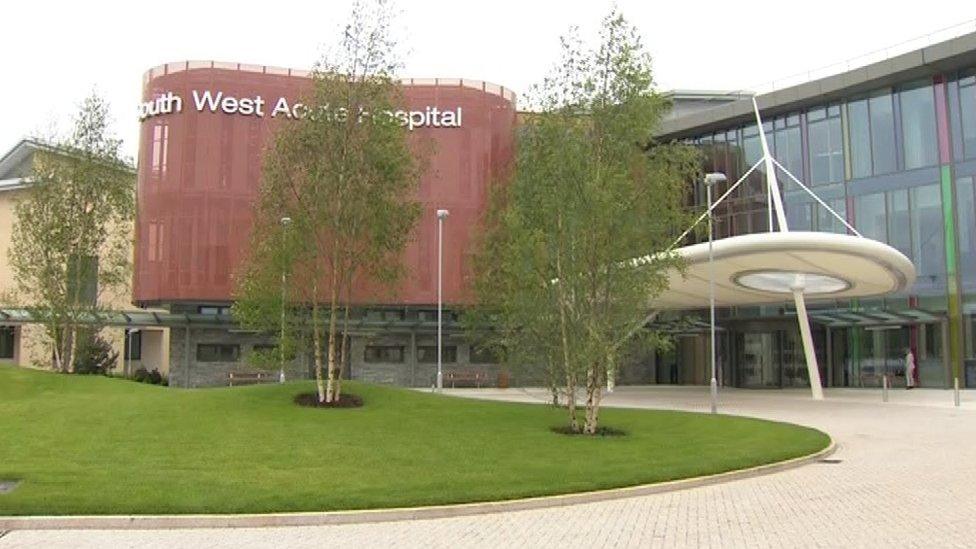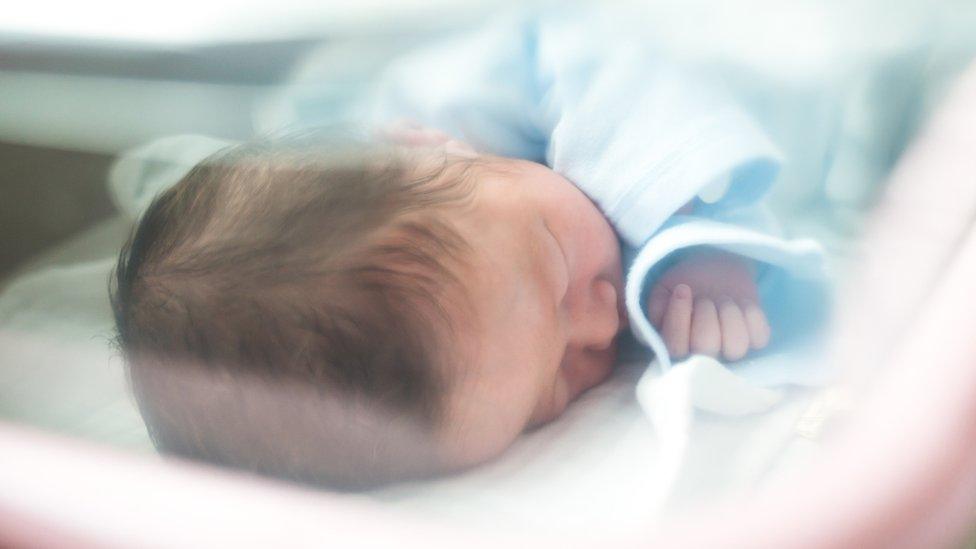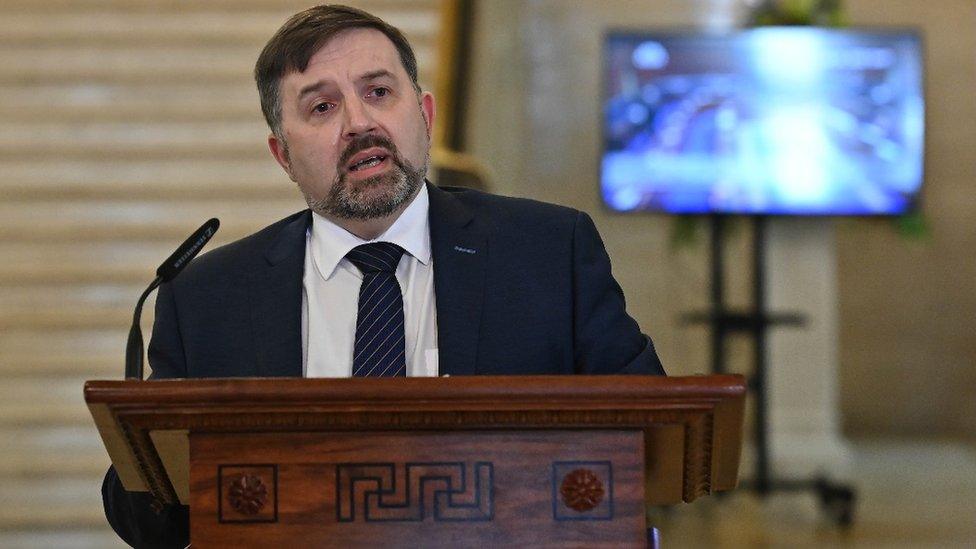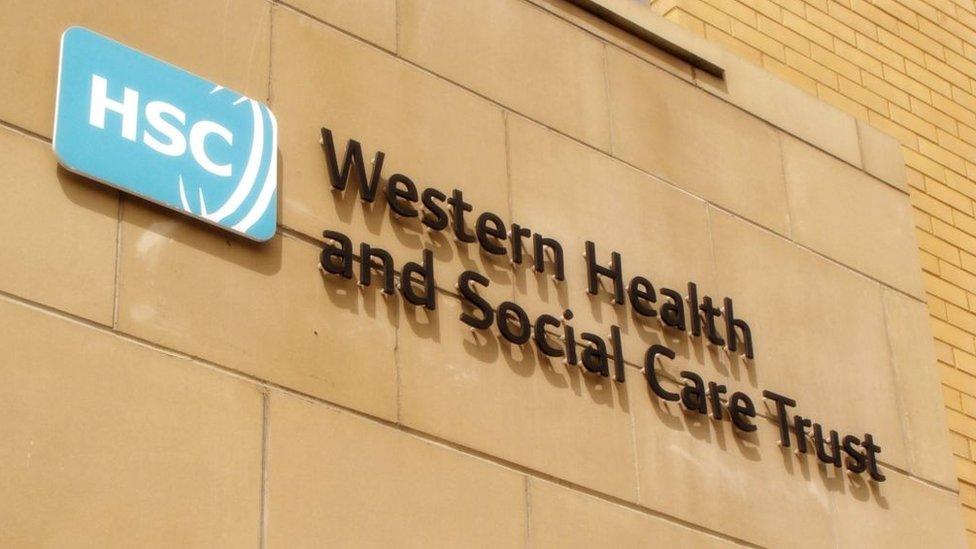NI Health: Staff shortage 'makes Enniskillen surgery fragile'
- Published

A lack of staff surgeons at the South West Acute Hospital means the service is 'fragile', the trust said
A decision has not been made on the future of emergency general surgery at the South West Acute Hospital (SWAH) in Enniskillen, the Western Trust said on Monday.
At a board meeting, members heard the service was fragile because there were too few consultant surgeons.
The trust is funded for six surgical positions, but there are currently three people in post.
The health minister said this would be of "serious concern" to the community.
"I have emphasised to the trust that it must leave no stone unturned in its ongoing recruitment efforts," Robin Swann explained.
"I accept it must plan for every eventuality and I expect to see a comprehensive plan. Constructive engagement is vitally important as the way forward is explored."

Health Minister Robin Swann said the news would be of serious concern to the Enniskillen community
The Department of Health and the board is working to expand non-emergency planned surgery at the site.
Director of Acute Services at the Western Trust Geraldine McKay said they had become increasingly concerned at the "fragility of emergency general surgery" at the hospital.
The issue is not money but the workforce and the challenge of recruiting and retaining experienced consultant surgeons to provide a service, the trust said.
Ms McKay said the three current staff surgeons are being supported by locums, but even that team may change soon.
"In recent days, we have been notified of forthcoming changes in the staff team which, unless restored, will leave it impossible to sustain a safe emergency general surgery service at the hospital," she said.
She added that it was very important to note that no decision was made at Monday's meeting and no recommendation came from the trust board.
"While intensive recruitment efforts will continue, we also have to prepare for a future in which these do not prove successful," she said.
"This planning will involve working very closely with our surgical team, our HSC (health and social care) colleagues and the department to consider and develop clinical pathways for patients served by SWAH who require this service.
"No matter the outcome, however, it is important to stress that elective surgery at the hospital will continue and there would be minimal to no impact on the other existing services at SWAH."

'Letting the public down gently'

It appears that the Western Trust has made up its mind about the future of the service but is letting the public down gently.
The outcome seems clear: They are unable to recruit and therefore unable to adhere to the Department of Health's six standards for providing safe and effective care to patients.
In June's review of general surgery, the department listed six key provisions that must be met to ensure that health trusts offered a safe service.
These include providing a workforce, a process and protocols which deliver a safe service, as well as quality assurance to monitor and gauge the provision of services.
Without all six in place, a hospital could not be expected to deliver emergency general surgery.

This is very similar to what happened at Daisy Hill Hospital in Newry when emergency general surgery was "temporarily" moved from that site to Craigavon Area Hospital.
At the time the Southern Health Trust said there were not enough surgeons at Daisy Hill.
At that stage, the Royal College of Surgeons said the issue highlighted that it was not about where life-saving surgery takes place, but rather who is carrying it out.
A spokesperson for the College in Northern Ireland said the ongoing debacle over Daisy Hill highlighted the need for a public conversation about transformation in order to provide safe hospital services.
In June, the Department of Health published a review of general surgery across Northern Ireland.
It highlighted workforce difficulties on general emergency surgery sites.

Neil Guckian said the Western Trust wanted to be up front with the public
It also raised the potential for planned surgical hubs which would become centres of excellence while, at the same time, tackling waiting lists.
In a statement, Neil Guckian, the Western Trust chief executive said the SWAH would make an "excellent regional elective centre".
He said the trust was determined to make that vision a reality and has been working with the department on plans for an elective overnight stay centre at SWAH.
"I am very aware that the situation with emergency surgery will be deeply concerning to patients and staff," he continued.
"It's not a position we want to be in but we have to plan ahead and be up front with the public about what that planning involves.
"I ask everyone to work with us constructively," he said.
Related topics
- Published6 June 2022

- Published30 June 2022

- Published24 February 2022

- Published4 November 2021
